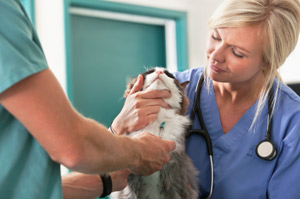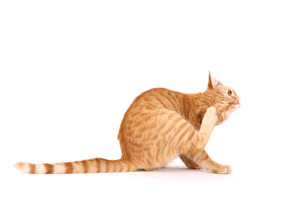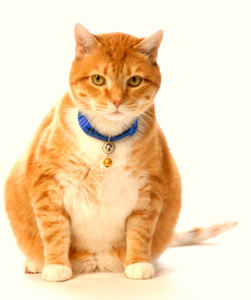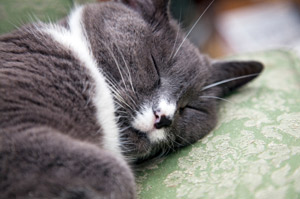General Health Information
1. Vaccinations

Regulations require our cats to be vaccinated against rabies. This does not mean that they would be exempt from rabies vaccination legally even if they do not go outside at all.
You should consult your veterinarian for the required vaccinations.
The Academy of Feline Medicine breaks vaccines down into the two categories of core and non-core. The core vaccines are recommended for almost all cats, while the non-core vaccines are only recommended for cats that have a high risk of being exposed to a particular illness or disease.
The rabies vaccine is the most common core vaccine. In addition, most veterinarians give the three-way combination vaccine, which includes Feline Rhinotracheitis, Feline Calici, and Feline Panleukopenia. This vaccination is usually given yearly, but some vets recommend only giving it every three years. Your veterinarian should discuss non-core vaccines with you.
2. Fleas

If your cat has fleas, you will rarely see an actual flea, but only the droppings they leave behind. These tiny droppings will be found at the base of your cat’s fur. If you think your cat has fleas, take a trip to the veterinarian as soon as possible. The veterinarian can recommend the best method of treatment for ridding of fleas both from your cat and your home.
3. Ticks
Ticks are bloodsuckers that will bury themselves in your cat’s fur, particularly in the neck and ear areas. Cats will remove most ticks during regular cleaning, but sometimes a tick will imbed itself in a spot that is hard to reach. If you see a tick on your cat, don’t use other home remedies (such as matches or alcohol) that could potentially be harmful to your pet. Contact your veterinarian right away.
4. Obesity

When it comes to weight gain, a cat’s body works in a very similar way to the human body: more food equals more fat. Simply put, the more food your cat eats, the more weight he/she will gain. A lack of exercise also contributes to weight gain. Some cats can sleep a whopping 18 hours per day, leaving only 6 hours for any type of exercise. Cats which are in their senior years are particularly prone to weight gain, as their metabolism slows down and their activity level steadily declines.
It’s fairly easy for your cat to seemingly become obese overnight. Because you see your cat every day, you may not notice he/she is gradually gaining more and more weight. You may notice, however, that he/she is less inclined to play and spends more time sleeping. This lethargic attitude is a symptom of obesity and should cause you to examine your cat more closely. You will likely find that he’s/she’s a few pounds heavier than the last time you checked.
Whether you have a kitten, adult cat, or senior cat, you can manage his/her weight by making sure the food he/she eats has appropriate nutritional value and that he/she eats only as much as he/she really needs. That sort of control plus exercise should guarantee that your cat maintains a healthy weight. It’s important that you spend some time every day playing with your cat, making sure he/she gets the exercise he needs. If he/she continues to gain weight, there may be some sort of underlying medical problem, so make sure he/she sees a veterinarian as soon as possible.
5. First Aid
When your cat gets hurt, you should be armed with the knowledge and materials necessary to help him/her. It's a great idea to keep a box of first aid items for your cat on hand:
• Antibacterial ointment
• Aspirin
• Cotton Balls
• Gauze pads and bandages
• Petroleum jelly
• Hydrogen peroxide
• Scissors
• Tape
• Towel
• Tweezers
Take the time now to learn some basic first aid. If an emergency situation arises, you'll be glad you did. If you wait until your cat is injured before educating yourself, it might be too late.
6. Ear Infection

Cats have very sensitive ears, so handle them gently. About once a week, swab the ear area with a cotton ball dipped in baby oil, removing any dark, waxy residue. Don’t use a cotton swab. You could easily damage his eardrum if he moves and the swab goes deeper into his ear.
You should also be concerned if you see excessive wax, dark residue in his/her ears, or if his/her ears have a bad odor to them. If this is the case, take him/her to the veterinarian as soon as possible. Your veterinarian will be able to diagnose the problem and treat it effectively.
7. Senior Cats

A cat that is well taken care of and sees the vet regularly can sometimes live up to twenty years! As your cat gets older, he/she will develop special needs. You will need to seek out ways to make his/her life as comfortable as possible and be ready to treat any special health problems. The following are some examples of common health problems that affect senior cats:
Arthritis
Arthritis, in particular, can affect older cats. Cats are great jumpers, and they make use of this ability many times during their daily activities. When a cat reaches his/her senior years, he/she will no longer be able to jump as easily. This is especially true of cats that develop arthritis. This condition is particularly common in cats that have had joint injuries in the past. Its effects range from slight stiffness to complete debilitation. If your cat seems to be suffering from arthritis, take him/her to the vet. Keep in mind that many cats have severe reactions to medications like aspirin. So as much as it hurts you to see your cat in pain, wait for a prescription from your veterinarian before giving any medication to your cat.
Deafness
One condition that commonly affects senior cats is deafness. Cats that have reached their senior years often experience a loss of hearing, some more than others. To help your cat adjust to this change as easily as possible, you will have to make some changes of your own. First, try talking louder. Your cat may not be completely deaf. He/she may still be able to catch some words, or at the very least, to pick up some vibrations and realize you’re trying to get his/her attention. Also, try using some hand motions. If he/she sees a movement out of the corner of his/her eye, he/she will likely turn his/her head to see what it is and find you there, attempting to get his/her attention.
Blindness
Just as with humans, a cat’s eyesight will start to deteriorate as he/she gets older. You may see him/her bumping into things or not noticing people walking by. Basically, the only way you can help your cat through this time is to be patient with him/her. You will need to keep a closer eye on him/her to make sure he/she doesn’t hurt him/herself and make some adjustments in the house to help him get around, if necessary. Keep in mind that cats tend to be very prideful, so try to be sensitive of your cat’s feelings during this difficult time. When your cat's condition worsens you should contact your veterinarian and get help.